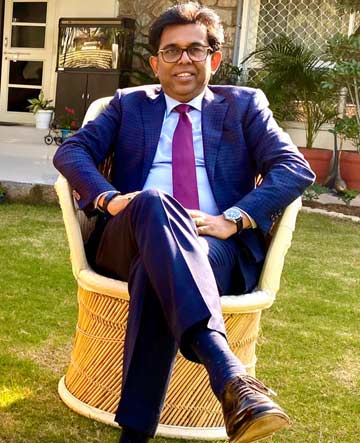Rajasthan has emerged as a role model state in the country in dealing with the COVID-19 pandemic. It has received accolades for controlling the virus spread in Bhilwara, and met with new challenge in Jaipur's congested walled city area. The state has also showed that it pays to invest in health schemes and infrastructure. A distinctive feature of the battle against COVID-19 has been the role played by the civil servants who rose to the occasion. THE WEEK spoke to Additional Chief Secretary, Health, Rohit Kumar Singh to know about state's experience of 'ruthless containment', a term he had coined.
You gave the term 'ruthless containment' to tackle COVID-19. What does it entail ?
Everybody has the same plan, but how you execute it is the key. Ruthless means you do it early and aggressively. It's a health emergency which affects lives of people, so this is not a time for niceties. You have to be strict and it pays off. People might get inconvenienced a bit, but if you enforce it strictly they would understand. You also have to combine it with the supply of essential goods. Remain firm but polite. Don't let them become adversaries.
Based on Rajasthan experience, what can the rest of the country learn?
We are still learning; the situation keeps evolving. Jaipur walled city and Bhilwara are two different ball games. There are structural differences in population density, how people live and how people engage socially. So you can't just be prescriptive of that strategy.
So you apply the same principles, but the execution mode has to be different depending on the local conditions. If there are ten people living in 400 square feet, you have to change the strategy.
Can you elaborate?
In Bhilwara, the nature of the problem was different. There was a hospital where doctors got infected. They are 'super spreaders' as many people from different parts of the city come in contact with them because of their profession.
Jaipur cases are different. They were spread by individuals who were irresponsibly roaming around on the motorcycles. Also, they were living with their families, which were socially engaging very closely.
So in Bhilwara, teams were sent quickly to impose lockdown. But in Jaipur, lakhs of people live in 1-2 square kilometer zone.
Your strategy was different from the ICMR protocol?
ICMR is the guiding principal, but you have to see reality. The ICMR directed contact tracing of confirmed cases. In a normal middle-class setting, this would mean family members, drivers and domestic helps. But you have to see the local situation where people are praying together and sitting together in the alleys. So, that definition doesn't apply here. We have tested aggressively in Rajasthan. We've done 50 to 60 thousand tests so far. That is why our numbers are higher.
What were the key challenges?
Our public health system has three distinct verticals. One is physical infrastructure challenges— the building, the equipment etc. The second is your human resources—shortages in absolute numbers and the deployment challenges. They are irrationally deployed as everyone wants to be at the state capital. The third is the delivery of services. But, as I have seen in 30 years of my service, every time there is a crisis—earthquake, floods, elections—everybody stands up to it.
What are your views on lockdown? Should it be extended?
It's a very tricky issue, as it involves lives and livelihoods. So if you lock down for a long time, people will die of hunger or have depression. My state's strategy is that you don't have to worry about the (positive) numbers, but the objective is to restrict the damage to the minimum. So we have a segmented strategy—look at vulnerable people, 60 years plus and people with co-morbid conditions. Help them aggressively. The young will eventually cure. Resources have to be channelised optimally.
What have been the key learning so far from the pandemic?
We must utilize this as an opportunity to strengthen our public health infrastructure. We are doing it very aggressively in Rajasthan. All district hospitals will have oxygen pipelines and machines, ICUs and more ventilators. So we could do a lot of testing. In every such crisis, you should augment our public health infrastructure.
Civil servants, especially the DMs, have been in the forefront of this fight. How do you see their role?
Our chief minister has led from the front. He has been taking meetings and seeking feedback. The only advantage we get, as civil servants, is that we engage with the government of India as we are IAS fraternity and we know people in different departments. This is a joint battle. The government of India has been cooperating 200 per cent with all the state governments. It's guiding us, motivating us and helping us. There's no politics being played, thankfully.
There has been talk about downsizing civil services and bringing in experts through lateral entry.
I think experts are required. But to manage anything, you need generalists. It's because they're the only ones who have the bigger picture. For example, in a hospital administration, even if you have an excellent doctor as a superintendent or director, he may not be administering it the best. Clinical side and management side are two different ball games. So, it's not a good idea to have a doctor as the health secretary, then your visions gets narrowed.



